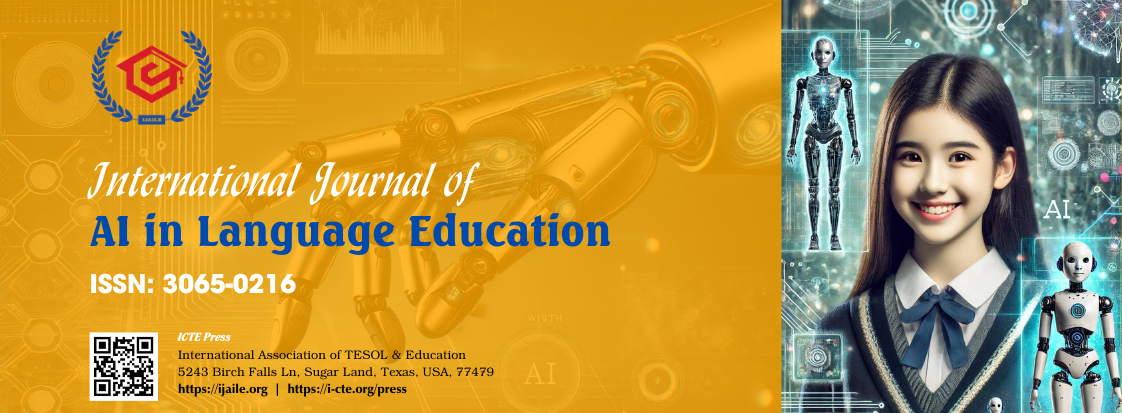The Perspectives of Post-graduates Majoring in English Regarding the Usage of QuillBot to Enhance Paraphrasing Skills
DOI:
https://doi.org/10.54855/ijaile.24113Keywords:
paraphrasing skills, paraphrasing tool, QuillBot, academic writingAbstract
Paraphrasing is considered an important skill for postgraduates in their journey toward pursuing an academic degree. This skill helps postgraduates avoid plagiarism and showcases their ability to analyze, research, and perform academic writing tasks. Although numerous studies have determined the importance of this skill, most postgraduates still frequently need help in achieving paraphrasing proficiency. The emergence of QuillBot, an AI-powered paraphrasing tool, is a potential solution for these frequent challenges in learning paraphrasing skills. The overall benefits of QuillBot on the academic writing skills of English learners have been recognized and proven in various studies. However, only some studies have delved into how QuillBot assists postgraduates who took part in improving their paraphrasing skills, serving the academic genre of writing. Therefore, this study recruited twenty English-majored postgraduates to investigate.References
Amyatun, R. L., & Kholis, A. (2023). Can Artificial Intelligence (AI) like QuillBot AI Assist Students’ Writing Skills? Assisting Learning to Write Texts using AI. ELE Reviews: English Language Education Reviews, 3(2), 135-154. DOI: https://doi.org/10.22515/elereviews.v3i2.7533
Alammari, A., & Abdel-Reheem Amin, E. (2023). EFL students’ perception of using AI paraphrasing tools in English language research projects. Arab World English Journals, 14(3). https://dx.doi.org/10.2139/ssrn.4591918 DOI: https://doi.org/10.24093/awej/vol14no3.11
Asmara, Y. V., & Kastuhandani, F. C. (2024). Studens’ Lived Experience in Utilizing QuillBot as an Online Paraphrasing Tool in Academic Writing. Globish: An English-Indonesian Journal for English, Education, and Culture, 13(1), 56-65. DOI: https://doi.org/10.31000/globish.v13i1.10088
Dung, T. (2010). An investigation in paraphrasing experienced by Vietnamese students of English in academic writing. Thesis, University of Da Nang, Ministry of Education and Training.
Fitria, T. N. (2021). QuillBot as an online tool: Students’ alternative in paraphrasing and rewriting of English writing. Englisia: Journal of Language, Education, and Humanities, 9(1), 183-196. DOI: https://doi.org/10.22373/ej.v9i1.10233 DOI: https://doi.org/10.22373/ej.v9i1.10233
Ginting, P., Batubara, H. M., & Hasnah, Y. (2023). Artificial Intelligence Powered Writing Tools as Adaptable Aids for Academic Writing: Insight from EFL College Learners in Writing Final Project.
Harshbarger, T. G. (2012). The Process of Paraphrasing: Exercises to Build Paraphrasing Skills. The Tsuda Review, 57, 67-94.
Ho, P. X. P. (2024). Using ChatGPT in English Language Learning: A Study on I.T. Students’ Attitudes, Habits, and Perceptions. International Journal of TESOL & Education, 4(1), 55-68. https://doi.org/10.54855/ijte.24414 DOI: https://doi.org/10.54855/ijte.24414
Hyland, K. (2002). Authority and invisibility: Authorial identity in academic writing. Journal of pragmatics, 34(8), 1091-1112. DOI: https://doi.org/10.1016/S0378-2166(02)00035-8
Irvin, L. L. (2010). What is academic writing?. Writing spaces: Readings on writing, 1, 3-17
Kurniati, E. Y., & Fithriani, R. (2022). Postgraduate students’ perceptions of Quillbot utilization in English academic writing class. Journal of English Language Teaching and Linguistics, 7(3), 437-451.
Kinga, S., & Gupta, G. S. (2021). Platforms: As foundation of sharing economy. Delhi Business Review, 22(1), 1-13. DOI: https://doi.org/10.51768/dbr.v22i1.221202101
Kurniati, E. Y., & Fithriani, R. (2022). Postgraduate students’ perceptions of Quillbot utilization in English academic writing class. Journal of English Language Teaching and Linguistics, 7(3), 437-451. DOI: https://doi.org/10.21462/jeltl.v7i3.852
Pham, V. P. H., & Le, A. Q. (2024). ChatGPT in Language Learning: Perspectives from Vietnamese Students in Vietnam and the USA. International Journal of Language Instruction, 3(2), 59–72. https://doi.org/10.54855/ijli.24325 DOI: https://doi.org/10.54855/ijli.24325
Miranda, D. (2022). The Impact of Paraphrasing Tools on Students Paraphrasing Skills (Doctoral dissertation, UIn Ar-Raniry). Postgraduate Students’ Perceptions of Quillbot Utilization in English Academic Writing Class
Nurmayanti, N., & Suryadi, S. (2023). The Effectiveness Of Using Quillbot In Improving Writing For Students Of English Education Study Program. Jurnal Teknologi Pendidikan: Jurnal Penelitian dan Pengembangan Pembelajaran, 8(1), 32-40. DOI: https://doi.org/10.33394/jtp.v8i1.6392
Mohammad, T., Alzubi, A. A., Nazim, M., & Khan, S. I. (2023). EFL paraphrasing skills with QuillBot: Unveiling students' enthusiasm and insights. Journal of Pedagogical Research, 7(5). DOI: https://doi.org/10.33902/JPR.202324645
Nguyen, T. T. H. (2023). EFL Teachers’ Perspectives toward the Use of ChatGPT in Writing Classes: A Case Study at Van Lang University. International Journal of Language Instruction, 2(3), 1–47. https://doi.org/10.54855/ijli.23231 DOI: https://doi.org/10.54855/ijli.23231
Nour El Houda, C. H. E. R. I. G. U. E. N. E., Zerhouni, A., & Naili, R. (2023). The Impact of Analysing QuillBot Products on Enhancing EFL Learners’ Paraphrasing Skills (Doctoral dissertation).
Stander, M. (2020). Strategies to help university students avoid plagiarism: A focus on translation as an intervention strategy. Journal of Further and Higher Education, 44(2), 156-169. DOI: https://doi.org/10.1080/0309877X.2018.1526260
Storch, N., & Tapper, J. (2009). The impact of an EAP course on postgraduate writing. Journal of English for Academic Purposes, 8(3), 207-223. DOI: https://doi.org/10.1016/j.jeap.2009.03.001
Syahnaz, M., & Fithriani, R. (2023). Utilizing Artificial Intelligence-based Paraphrasing Tool in EFL Writing Class: A Focus on Indonesian University Students’ Perceptions. Scope: Journal of English Language Teaching, 7(2), 210-218. DOI: https://doi.org/10.30998/scope.v7i2.14882
Wahab, Z., Iqbal, L., Ullah, I., Nawab, R., & Ubaid, U. U. (2023). Quality Assessment Of Automatic Paraphrasing Tool For English: An Analysis At Lexical Level. Journal of Namibian Studies: History Politics Culture, 33, 1624-1645.
Xuyen, N. T. (2023). Using the online paraphrasing tool Quillbot to assist students in paraphrasing the Source Information: English-majored students’ perceptions. In Proceedings of the 5th Conference on Language Teaching and Learning (pp. 21-27). DOI: https://doi.org/10.21467/proceedings.150.3
Downloads
Published
Issue
Section
License
Copyright (c) 2024 Ngoc Quynh Nhu Pham (Author)

This work is licensed under a Creative Commons Attribution 4.0 International License.












